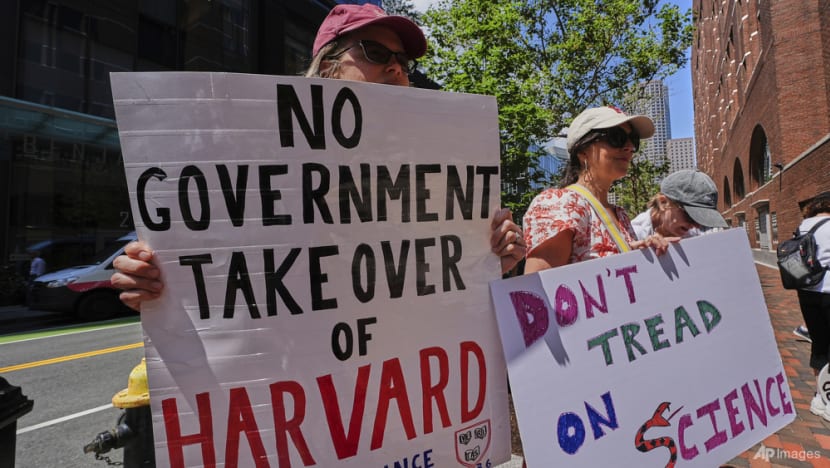Trump policies spark fears of US losing scientific edge as EU courts researchers
Spending cuts at academic institutions and tighter restrictions on foreign students could undermine the US’ standing as a leading destination for researchers and scientists.

Protesters gather outside the Moakley Federal Courthouse, where Harvard University challenged US$2.6 billion in funding cuts by the Trump administration, Jul 21, 2025, in Boston, US.(Photo: AP/Charles Krupa)

This audio is generated by an AI tool.
WASHINGTON/ANTWERP: The United States risks losing its edge in science and innovation, academics warned, as President Donald Trump’s funding cuts and tighter restrictions on foreign students threaten to drive top researchers abroad.
Some American scholars fear such a brain drain could give other nations the chance to surge ahead.
Science historian Robert N Proctor from Stanford University said Trump has “launched a war on science”, warning that what was once an age of enlightenment is giving way to a “dark period where scientists are losing their jobs”.
“This is going to have implications for how we predict the future, how we understand epidemics (and) new viruses, how we're able to predict or not predict hurricanes or deal with things like tsunamis,” he added.
“That capacity is going to be diminished and other countries of the world are going to benefit.”
PURSUING ROLES OVERSEAS
A recent poll by science journal Nature suggests that this shift is already underway.
Three-quarters of US scientists surveyed said they were considering leaving because of Trump’s policies, with Europe and Canada among the top relocation choices. Some academics have already departed.
Emily McGrath, a senior fellow and director of workforce policy at think tank The Century Foundation, told CNA that US-based innovators are leaving for countries with stronger academic freedom, greater research funding and clearer protections for international students.
“Going after academic freedom in the university setting, I think, is highly concerning. It’s not something that most academics want to lose. So if they have an option, they may choose to leave,” she added.
“A huge portion of our talent base is international. If those individuals feel less safe here, if they are worried that they don't have rights, that they could be deported (or) locked up with no recourse, those individuals will leave.”
CLIMATE OF FEAR
There is also concern that recent policy changes could spur an exodus of Chinese students, who may fear a repeat of the China Initiative introduced in Trump’s first term.
The programme’s aim was to prosecute suspected Chinese spies in research and industry, and to protect US intellectual property.
But civil rights groups said it created a climate of fear among Asian Americans.
Trump has hinted he might soften his stance on admitting Chinese students, despite pushback from some supporters.
“I think it's very insulting to say students can't come here…” said Trump last month on his decision to issue 600,000 Chinese student visas.
“I like that their students come here, I like that other countries’ students come here. And you know what would happen if they didn't? Our college system would go to hell very quickly.”
The White House later clarified that the 600,000 visas would be issued over two years, in line with numbers issued in previous years.
Still, the Trump administration’s campaign against elite higher education shows no sign of slowing, despite legal setbacks.
It has said it will appeal a court ruling that ordered the restoration of more than US$2 billion in research funding for Harvard University that it had earlier frozen.
Experts said this suggests that even amid warnings of a brain drain, the administration remains determined to press ahead.
EUROPE AS A DESTINATION
Meanwhile, some European institutions are moving to seize the moment.
The European Union has launched new initiatives to strengthen its position in critical areas such as technology and science and close the gap with the US.
In an increasingly competitive world, the bloc said that fresh initiatives are needed to keep Europe at the cutting edge.
Maarten Weyn, vice-rector at the University of Antwerp, said the uncertainty in the US is making Europe increasingly attractive to academics from countries like China and India.
“It’s not clear what is the potential in the long-term for people when they move to the US,” he added.
“It is quite clear in Europe and I think that … the uncertainty in the US will make people change their minds and … come to Europe instead.”
Dimitris Koureas, managing director for digital strategy and innovation at the Naturalis Biodiversity Center in the Netherlands, said Europe has the potential to become a hub for applying technologies in ways that create real impact.
But academics caution that it is too soon to predict a large-scale brain drain from the US, pointing out that Europe still faces challenges in attracting and retaining top talent.
Reinhilde Veugelers, a senior fellow at economic think tank Bruegel, said: “Very often, they turn to the US market because that’s a much bigger single market, a willingness to pay also for new innovations (in the US) than in Europe – that framework condition still is an issue.”
















